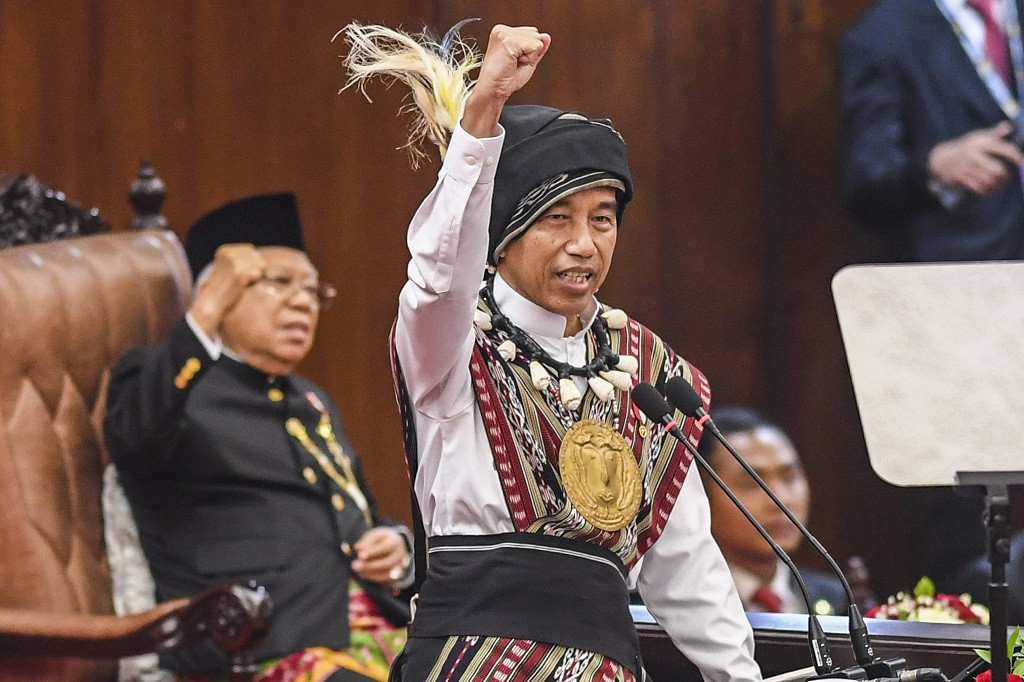Popular Reads
Top Results
Can't find what you're looking for?
View all search resultsPopular Reads
Top Results
Can't find what you're looking for?
View all search resultsFiscal stability, credibility are key
Though the draft 2024 state budget might be criticized for being boring, it offers the soothing effects of familiarity while considering the global uncertainties that continue linger, and hence avoiding the likelihood of any midyear adjustments.
Change text size
Gift Premium Articles
to Anyone
T
he government’s conservative assumptions for the key economic indicators of growth, inflation, rupiah exchange rate, interest rate, oil price, fiscal deficit and state revenues in the draft 2024 state budget should be of comfort to the market, as they ensure the unlikelihood of any painful adjustments midway through the next fiscal year.
The conservative posture President Joko “Jokowi” Widodo has taken in the state budget, which he proposed to the House of Representatives on Wednesday, is a realistic fiscal stance that accounts for the lingering uncertainty about the global economy, China’s weakening economy and rising geopolitical risks.
In fact, given the softening (normalizing) of commodity prices, the escalating political noise in the run-up to the Feb. 14, 2024 general election, regional head elections next November and the declining appetite in Indonesia among foreign direct and portfolio investors, the government does not have any fiscal space for pump priming.
An expansive budget would raise greater concern over the country’s external balance and increase downward pressures on the rupiah, consequently raising the costs of imports and heightening inflationary pressures.
Moreover, since most cabinet members will soon become preoccupied with campaigning for their own political agendas and economic management will switch to automatic pilot under the finance minister and the central bank governor, the government does not have a better policy alternative but to focus on maintaining the stability and credibility of its fiscal and monetary management.
The 6 percent increase in total spending to Rp 3.30 quadrillion (US$216 billion) planned for 2024 is not expansive, taking into account inflation of 5.5 percent in 2022 and around 3 percent this year. Likewise, the 9 percent planned rise in tax revenues should not frighten businesspeople: The larger receipts seem realistic in view of the full enforcement of the laws on tax harmonization and financial sector development and strengthening.
The 8 percent planned wage hike for civil servants, National Police personnel and Indonesian Military members, as well as the 12 percent hike for state pensioners do not appear to be political gestures. These hikes are part of the gradual improvements in the remuneration of state employees amid the ongoing bureaucratic reform. Besides, President Jokowi does not need to offer pork barrels, as his second and final term ends in October 2024.
The biggest expenditure items for 2024 are regional funding, education, health, social safety net, infrastructure and investment, which will remain largely similar to this year’s budget appropriations. But the quality and distributional impacts of government spending will still be quite positive in the long-term for the good of the economy, notably for reducing inequality between provinces and between workers in the informal and formal sectors as well as rural and urban areas.
President Jokowi sent the right message about the goal of Indonesia’s development for the next 10 years to the administration that will succeed him, when he asserted the importance of nurturing human resources that were productive, innovative and competitive by improving the quality of education, healthcare and social security services and accelerating infrastructure development.
The government’s biggest challenge remains the same: speeding up the execution of its investment budget, which is notorious for always falling short of the target.
Judging from the state budget’s functioning as a communication channel that signals the government’s behavior, prices, priorities and commitments, the draft 2024 budget sends the right fiscal message to the market.
Understandably, several analysts might still criticize the draft budget as a boring document that lacks bold and creative programs, but boring is very different from bad.
Investing in education will generate a productive national workforce. Investing in infrastructure will boost efficiency in transportation and communication, improve connectivity across the archipelago and with global supply chains, and curb logistics costs.
If we want to talk about medium- and long-term growth, we have to talk about policies that are familiar, anyway.










